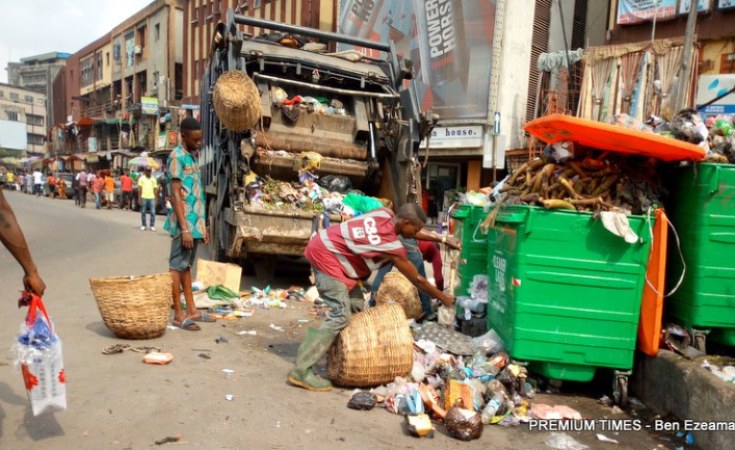Nigeria: Waste Pickers in Lagos Tell Their Stories About a Dangerous Existence
ANALYSISBy Olanrewaju Dada
Lagos, Nigeria's economic hub, with a population of more than 15 million, generates an estimated 12,000 metric tonnes of waste daily, which comes to about 4.3 million tonnes of waste annually. This ends up on the streets and in the city's four officially designated landfills.
These sites support thousands of people who search through what's discarded for materials with resale value. Our survey of two landfill sites discovered a total of about 2,800 waste pickers - men and women.
Most landfills have buy-back centres, where the waste pickers sell recyclables such as metal, glass, plastic and paper. We observed that the subsistence incomes of waste pickers fluctuated daily, depending on the volume of recyclable waste delivered to the landfill, its quality, and varying prices. The daily average income of the street waste pickers was N2,075 (US$4.99) while that of the landfill waste pickers was N5,530 (US$13.30). Though this average income is higher than the poverty line, the work and the environment are hazardous, and its value is not fully appreciated.
Waste pickers often work without protective gear, unassisted, and without access to primary care or first aid and employment regulations. They operate on the margins of or outside the formal process of managing solid waste, but play vital roles, especially in reuse, recycling and cost recovery.
They work in unsheltered environments and are unprotected from severe heat, sun, rain, and cold weather. These conditions have been linked with cardiovascular disorders. Likewise, exposure to dust, micro-organisms and microbial toxins can result in chronic respiratory diseases, skin problems and gastrointestinal illnesses.
Research on waste pickers has tended to focus on the health risks of their occupation. Our study confirmed that Lagos waste pickers were exposed to occupational health hazards, but also aimed to reveal more about their well-being and their own perspectives.
The findings may help waste management authorities to make landfills a more dignified working environment that sustains waste pickers' livelihoods without jeopardising their well-being.
Occupational hazards of waste picking
For our research, we interviewed 125 waste pickers in Olusosun landfill and 27 in Solous landfill. Olusosun is situated in Ojota, Kosofe Local Government Area and Solous in Egbeda, Alimosho Local Government Area of Lagos state.
We established that waste picking in landfills was mostly done by younger people: 88% of our respondents were aged between 18 and 45. The collection of recyclable materials and items was mostly done by men, while the sorting was mostly by women.
They operated at the landfill because of the abundance and concentration of waste there. In fact, 66% lived at the dumpsite. The majority worked seven days a week. The average number of years they had spent doing this work was seven.
Most of the waste pickers we spoke to had experienced illnesses or injuries. Body pain, bruises and fatigue were the most frequently mentioned conditions. Most waste pickers had bruises or scars on their hands, arms and feet, mainly from cuts or piercings during sorting.
Other illnesses and injuries were caused by inappropriate posture and prolonged work hours. Many had sore or itchy eyes caused by exposure to smoke from burning garbage and to other hazards like methane gas, sulphur dioxide and carbon monoxide.
The people in our study didn't use personal protective equipment or go for regular medical checks.
When we asked about their subjective feelings, we found that the waste pickers were very dissatisfied with their unhealthy working conditions, the extreme poverty they lived in, and the stigmatisation they experienced. Many used alcohol and drugs. Most said they were distressed by their work.
They experienced discrimination, prejudice and social rejection.
Yet with low education levels - 61% were illiterate - they could not find other work. They settled for waste picking as a last resort to earn a living.
Value of waste pickers
Nigerian authorities don't fully appreciate the beneficial role of waste pickers. These workers contribute to environmental sustainability by reducing wastes in dumpsites and providing material for recycling and reuse. But they are never considered when waste management policies are designed.
Waste pickers should be recognised in waste management policies and their well-being should be taken seriously.
Waste management authorities, NGOs and multinational organisations must ensure that potable water, sanitary facilities and clinics are provided at landfills. Waste pickers must be allowed to use them free of charge, as is the case in Brazil.
In addition, waste pickers should be encouraged to develop workplace health frameworks to alleviate accidents and risks.
Training to build their capacity and expand their skills, giving them other work opportunities, could reduce their dissatisfaction.
There is also a need for investment in regular occupational health and safety training through public/private partnerships. Waste pickers should be provided with personal protective equipment and monitored to ensure proper use. Non-compliance should be penalised.
Lastly, the rights of waste pickers must be protected. They should not be stigmatised but treated as essential to waste management.
Olanrewaju Dada, Lecturer, Department of Urban and Regional Planning, Olabisi Onabanjo University, Ago-Iwoye, Nigeria, Olabisi Onabanjo University

No comments:
Post a Comment